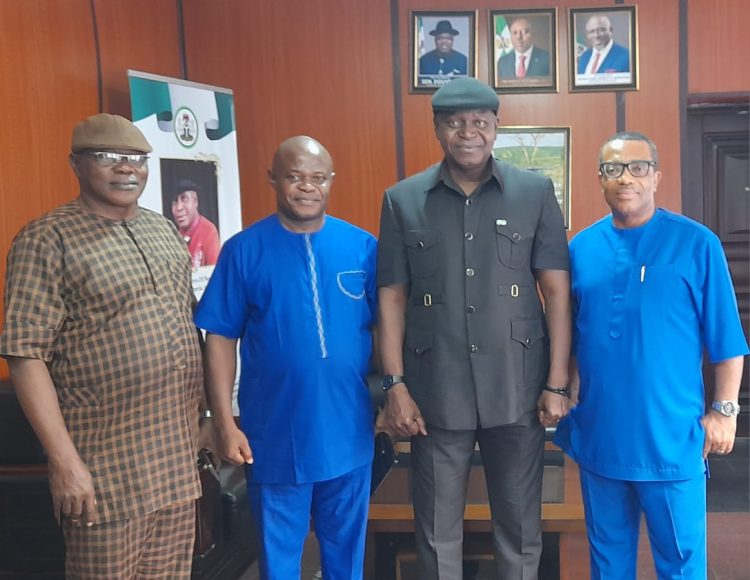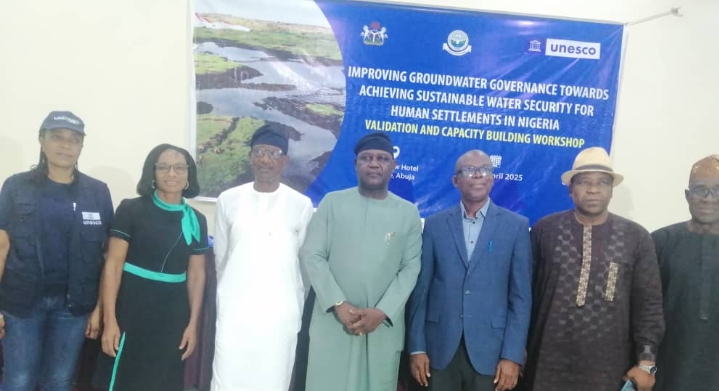By: Goodluck E. Adubazi, Abuja.
The Federal Government, UNESCO, and the Nigerian Water Resources Institute (NWRI) have joined forces to improve groundwater governance and achieve sustainable water security for human settlements in Nigeria, as over 1.25 billion people are estimated to rely on groundwater by the year 2050.
This collaborative effort aims to address the country’s water challenges, ensuring that Nigerians have access to clean and reliable water sources.
The partnership highlights the importance of effective water management and governance in achieving sustainable development Goals.
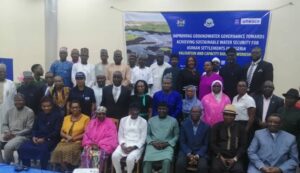
On a two-day “Valid And Capacity Building workshop” which is slated to be held from 9th – 10th, April 2025 at Rockview Hotels, Abuja, titled: “Improving Groundwater Governance Towards Achieving Sustainable Water Security For Human Settlements in Nigeria, Mr. Albert Mendy, the Head of UNESCO Abuja office, And Representative of UNESCO To Nigeria, ably represented by Dr. Enang Moma, Head of Science Sector, UNESCO Abuja Office, deliver a welcome address speech on the Sub – Project that is developed by the UNESCO Abuja office and National Water Resources Institute NWRI, Kaduna and implemented within the framework of the UNESCO Korean Fund – In Trust Funded project titled ” Water Security for Human settlements in Developing countries under climate Change”.
Mr. Mendy, in his speech, noted that groundwater is a crucial natural resource that plays a significant role in supporting ecosystems, agriculture, livelihood, and the well-being of human communities.
Standard-Times Nigeria gathered from Mr.Mendy’sy’s welcome address, the United Nations World Water Development Report for 2022, that groundwater makes up 99% of the world’s liquid freshwater and serves as the primary drinking water source for 50% of the global population.
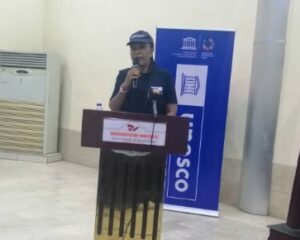
According to Mr. Mendy, most of the rural and urban human settlements in Africa and indeed in Nigeria are dependent on groundwater because it is locally available”, Mr. Mendy remarks.
Drought resilient, has quality requiring minimal treatment, it is,, therefore crucial to prioritize the effective management of this valuable water resources through enhanced groundwater governance governance” ” he added.
Speaking further, Mr. Mendy emphasized the importance of the subproject to which, the UNESCO Abuja office and, NWRI Kaduna worked together to develop which was graciously approved for implementation in Nigeria, the goal of the Sub-Project according to Mr. Mendy is to improve knowledge-based management and governance of groundwater resources to support Nigeria in achieving sustainable water security for human settlements as well as build resilience”, He remarked.
Mr. Mendy maintained that the implementation started in the last quarter of 2023, and we are now in the concluding phase of the project implementation” ” he said.
Mr. Mendy expressed happiness that the UNESCO and NWRI collaboration with the Regional Centre for Integrated River Basin Management (RC-IRBM), worked to implement the activities outlined in the Sub-Project results framework and has achieved (3) of the four (4) outputs, according to Mr. Mendy, the remaining one output is focused on publication and the feedback from this workshop will contribute to the publication and final output, the details of the progress of implementation of the Sub – Project, Mr. Mendy added will be presented during the workshop.
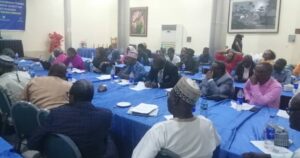
Mr. Mendy immensely thanked the participants for committing their time and knowledge to the success of the workshop and by extension the Sub-Project, just as he implored the participants to keep giving their best to put Nigeria on the path of achieving sustainable water security as well as SDGs 6, he appreciates the Honourable Minister of Water Resources and Sanitation, Prof. Joseph Terlumun Utsev, ably represented by the Permanent Secretary of the Ministry of Water Resources, Prof. Richard, for supporting the implementation of UNESCO hydrology activities in Nigeria and indeed in the region.
Mr. Mendy, however, expressed gratitude to the Director General, National Water Resources Institute, NWRI, Kaduna, Prof. Emmanuel Adanu, as well as, Dr. Omogbemi Yaha, Regional Center for Integrated River Basin Management (R-IRBM), and the Secretary-General, Nigeria NatCom – UNESCO, Mr. Lateef Olagunju, for enabling a valuable partnership between NWRI and UNESCO in the implementation of the Sub-Project, he also appreciate the unwavering support of the Director of UNESCO category 11 and the organizing team of UNESCO, NWRI and RC – IRBM, for their diligence in ensuring the successful implementation of the workshop, just as he said again UNESCO stands ready to support all follow – up actions of the workshop.
Honourable Minister Federal Ministry of Water Resources and Sanitation, Prof. Joseph Terlumun Utsev has emphasized the importance of Sustainable Water Solutions whether at the local, regional, or international require creativity, new Honourable Minister for Water Resources and Sanitation has said sustainable water both local and international require creativity, new scientific knowledge, discoveries, and innovation, through scientific collaboration and partnership”, Hon. Minister remarks. knowledge, discoveries, and innovation, through scientific collaboration and partnership”, Hon. Minister remarks.
I am aware this workshop brought together topnotch water resource experts, hydrologists, policymakers, and practitioners amongst others to ensure the sustainability of the project, result beyond UNESCO support, it is expected that all the recommendations to be made will align with national priorities in terms of sustainable water security adaptable to climate change for human settlement in Nigeria”, He states.
Speaking further, the Honourable Minister added that he is also aware that one of the key milestones to emerge from the workshop is to agree on project ideas that would focus on groundwater quality to contribute to water security in Nigeria to align with the national priorities of the renewed hope Agenda of President Tinubu and National plan”, The Hon. Minister remarks.
Prof. Utsev assured the distinguished audience that the Federal Ministry of Water Resources and Sanitation will continue to support any effort aimed at delivering insights into modern approaches for sustainably managing our vast groundwater resources for increased water access and coverage”, Prof. Utsev added.
The Hon. Minister, ably represented by the Permanent Secretary of the Ministry of Water Resources and Sanitation, Prof. Richard congratulates the organizers of the workshop, the UNESCO Abuja office, NWRI, and the Regional Center for Integrated River Basin Management for making the workshop a reality, just as he particularly expressed his deep appreciation to UNESCO Abuja Office for consistently partnering and collaborating with NWRI and Regional Centre for Integrated River Basin Management in addressing specific and critical water challenges in the sub-region through capacity building and applied research, just as he wished all participants a good deliberation all through the period of the workshop and look forward to a fruitful outcome that will chart the course or way forward in enhancing sustainable groundwater resources management in human settlement, as he declared the workshop opened.
Other speakers at the workshop are Prof. Emmanuel Adanu, Director General, National Water Resources Institute (NWRI ); Dr. Idowu Olagunju, Secretary General, Nigerian National Commission for UNESCO (Natcom – UNESCO); Prof. O. D. Jimoh, chair. Nigeria UNESCO IHP Committee, amongst others.
The two-day workshop has Specific Objectives of the Sub – Project including:
A desktop review of studies on the effects of climate change on Nigeria’s groundwater resources (effect of climate change on quality and availability), implementation for human settlements, and suggestions for climate-friendly infrastructure.
Develop guidelines and tools for improving groundwater governance for water security and building the resilience of urban Human Settlements against the impact of climate change.
Strengthen the human resources capacity of the Nigerian groundwater experts on the tools developed (strategy /guidelines and plans) to ensure the sustainability of the project beyond UNESCO’s support.
Produce a publication with the main results of the project for dissemination beyond the proposed capacity building and workshops.
The Sub – Project has a national focus, urban human settlements of nine cities using groundwater from the two broad Geological terrains in Nigeria, namely basement and sedimentary, Damaturu (Yobe State), Kaduna (Kaduna), Kano (Kano), Katsina (Katsina State), Jos (Plateau State), Calabar (Cross River State), Benin (Edo State), Yenegoa (Bayelsa State), Warri (Delta State)
To ensure the effectiveness and applicability of these studies, guidelines were developed, to receive feedback, and a validation and capacity-building workshop was organized titled – “Improving Groundwater Governance towards achieving sustainable water security for Human Settlement in Nigeria, with specific objectives of the workshop as follows:
To present the report of studies, framework, and guidelines developed to receive feedback and validation.
To strengthen the capacity of groundwater experts on the tools developed (Guidelines, report, framework) to ensure the sustainability of the project results beyond UNESCO’s support.
Agree on a project idea focused on Groundwater quality – contributing to water security in Nigeria as well as aligning with national priorities – of the Renewed Hope Agenda and National development plan. Day one of the two-day workshop had in attendance stakeholders in the water sector and was flanked with a group photo.




